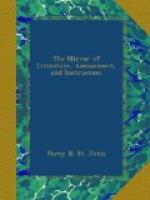* * * * *
West.—A New York paper states that the old sign of the Bull’s Head, which has hung at a house in Strawberry-street, for nearly seventy years, is ascertained to be one of the first productions of Benjamin West, and is said to be the first painting of the kind ever executed in America. The wood on which it is painted is much decayed, but the paint and figures are visible.
* * * * *
Congreve is said to have written his comedy of the Old Bachelor and part of the Mourning Bride, in a grotto formed in a steep rocky hill in the grounds of Ham Hall, in Dove Dale, Derbyshire. This romantic retreat was furnished with a stone seat and table, and herein the poet and dramatist was accustomed to seek refuge from the license of a London life.
* * * * *
Rousseau appears to have been one of the unhappiest as well as the most unamiable of men. He imagined himself the persecuted of all persecutors, and sought an asylum in England from his supposed enemies. In April, 1766, having just settled in Derbyshire, he wrote “Here I have just arrived at last at an agreeable and sequestered asylum, where I hope to breathe freely, and at peace.” He lived chiefly at Wootton Hall, and delighted to pass his leisure in the romantic Dove Dale. He did not, however, long remain “at peace,” for in April following, he returned to the continent, heaping reproaches on his best friends. The rent of the house in which he lived had been greatly reduced, to allure him into the country; his spirit revolted at this; and as soon as he heard of it he indignantly left the place. Whilst at Wootton Hall, he received a present of some bottles of choice foreign wine; this was a gift, and his pride would not permit him to taste it; he therefore left it in the house untouched for the next comer. For some reason or other, or more probably for none, he had determined not to see Dr. Darwin. The Doctor, aware of his objections, placed himself on a terrace, which Rousseau had to pass, and was examining a plant. “Rousseau,” said he, “are you a botanist?” They entered into conversation, and were intimate at once; but Rousseau, on reflection, imagined that this meeting was the result of contrivance, and the intimacy proceeded no further.




